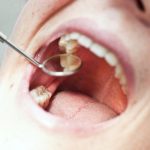Your mouth may be warning you about diabetes and heart disease
 (NaturalHealth365) Researchers in Japan have uncovered something unexpected: your oral health might predict serious diseases long before your doctor’s blood work shows any red flags. The study followed 118 people over 50 and found a clear pattern. Those with missing teeth, coated tongues, and poor mouth function were already developing diabetes, high cholesterol, and kidney problems – often before these conditions showed up in lab results.
(NaturalHealth365) Researchers in Japan have uncovered something unexpected: your oral health might predict serious diseases long before your doctor’s blood work shows any red flags. The study followed 118 people over 50 and found a clear pattern. Those with missing teeth, coated tongues, and poor mouth function were already developing diabetes, high cholesterol, and kidney problems – often before these conditions showed up in lab results.
Dr. Mitsuyoshi Yoshida from Fujita Health University, who led the research, put it bluntly: “Maintaining good oral health is the first step in maintaining overall health.”
Your mouth reveals disease risk years early
Individuals with higher blood sugar levels had fewer functional teeth and poorer tongue coordination. High cholesterol correlated with tongue coating and weak oral motor skills. Kidney issues? A similar story – coated tongues, missing teeth, and poor oral function.
A quick tongue test at your dentist could potentially catch health risks years ahead of expensive lab work.
Why this connection exists
Your mouth hosts over 700 types of bacteria. When oral health breaks down, harmful microbes don’t stay contained. They slip through inflamed gums straight into your bloodstream, creating a direct pathway to your heart, kidneys, and other organs.
Chronic gum inflammation forces your immune system into overdrive, slowly wearing down your body’s defenses. There’s another problem most people miss: when you lose teeth or develop chewing difficulties, you naturally avoid tough foods like vegetables and lean proteins. Poor nutrition then accelerates the exact diseases your oral problems were already signaling.
Compromised tongue function also means swallowing more harmful bacteria, which disrupts gut health and lets these microbes potentially re-enter your bloodstream.
What you can do starting today
Strengthen your mouth function. Do tongue exercises daily. Press your tongue firmly against the roof of your mouth for 10 seconds, and repeat several times. Stretch your tongue in all directions. Eat foods that require real chewing, such as raw vegetables and tougher cuts of meat, to keep your jaw muscles strong.
Fix your mouth’s bacterial balance. Eat fermented foods regularly, such as kefir, sauerkraut, and kimchi. These introduce beneficial bacteria that outcompete harmful ones while reducing inflammation throughout the body.
Try oil pulling. Swish coconut or sesame oil in your mouth for 10-15 minutes before brushing your teeth. Research shows that this reduces harmful bacteria, improves gum health, and lowers inflammation markers.
Get the right nutrients. Vitamin D supports the structure of teeth and gum health. Vitamin K2 directs calcium where it belongs. Magnesium plays a crucial role in muscle function, including that of the tongue muscles. Omega-3s help combat the inflammation that links oral problems to chronic diseases.
Keep saliva flowing. Drink plenty of water. Be cautious of medications that can dry out your mouth. Healthy saliva neutralizes acids and naturally washes bacteria away.
Deal with tongue coating. Scrape your tongue each morning. Since the study linked tongue coating to cholesterol and kidney problems, this simple habit could have bigger health benefits.
The healthcare gap nobody talks about
Most dentists focus on cavities and gum disease. Most doctors rarely ask about your mouth when evaluating the risk of chronic diseases. You’re left navigating two systems that barely communicate.
The researchers acknowledged their study was observational – they couldn’t prove oral problems directly cause chronic diseases. The relationship might work both ways. They called for larger studies to nail down these connections.
However, they also suggested incorporating oral function tests into regular health screenings. These simple assessments might catch at-risk people before problems become serious.
Where to find real solutions
While this research reveals the critical importance of oral health in preventing chronic disease, it also highlights a significant problem: where can you find comprehensive answers that bridge both dental and medical knowledge?
Most healthcare providers aren’t trained to see these connections. You need expertise that spans toxicology, nutrition, biological dentistry, and preventive medicine. You need to understand which dental materials are safe, how to detoxify properly, which supplements work, and how to find practitioners who won’t dismiss these oral-systemic connections.
The solutions exist, but they’re scattered across different specialties that rarely communicate with each other.
Get access to Jonathan Landsman’s Holistic Oral Health Summit, featuring 33 leading scientists, researchers, doctors, and nutritionists who understand these connections between oral health and chronic disease. Discover proven methods to optimize oral function, reduce harmful bacteria, and prevent the chronic diseases this research warns about.
Sources for this article include:



